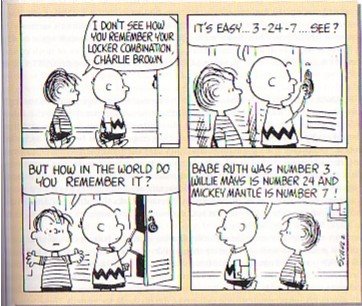 This chapter is the favorite for most of my students: tricks of the trade!
This chapter is the favorite for most of my students: tricks of the trade!How to remember all that information we process on a daily basis? How to remember that enent that even did not happend, but we need to do?
We know that it is important not only WHAT information we process and try to remember it later, but also HOW we process that information. In other words is important the content and the context. The level of processing: superficial (shallow) or deep (meaningful, personal). That is why you teachers are told always: Make it meaningful, make it personal, use groups, and hands-on activities. All will help making that information personal, and hopefully processed on a deeper level. Cognition and memory (and learning) is situated, otherwise said, is context dependent. The way we encode the infromation reflects and affects how we retrieve (recall, remember) the information stored in the LTM.
Should we also know that along with cognitive factors there are psychological and physiological factors. How do you learn and keep in memory the information when you are under great stress, or in a bad mood, and how do you learn when you are sick (bad headache, stomach pain, etc.).
Practice, practice, practice... sounds a good encouragement, but we know that repetition is not enough, it all boils down again to superficial or deep level of processing. Be aware that cramming in the night before the exam will result perhaps in a most wanted A, but fast come, fast go! One day after the exam the student might not remember what the exam was all about.
Conclusion: Distribute the practice. Learn and re-learn over a longer period of time. So, instead of cramming the night-before is better to start a couple of weeks ahead and each week revise again the previous information. Know that when we repeat the information we learned in previous weeks we bring that information into WM, then we store it then back in LTM and each time we revise that information we do the same. As a result when exam time comes the most-wanted-A is granted, and as a bonus we remember even three weeks after that exam!
Some tricks to remeber the information are based on mnemonics (visual, or using keywords, method of loci - imagine things on a list situated in familiar places to you).
Don't forget chunking (not only numbers and letters but objects, meanings, can be gathered together). Make charts, graphs, hierarchical charts and schemas, make stories about what you would like to keep in mind.
Remember what you must do in three weeks? You for sure use Prospective memory. That is memory for things that did not happend yet but will have to happen. Usually we are good in remembering what we are supposed to do in the future, but if we have a usual schedule and at one time needs a small change in the pattern, then we might end up being absentminded.
You take the same road to come to school to attend EPFR515, then one day you were supposed to make a small change and stop at the grocery store, but you find yourself remembering that only when you just passed the intersection where you were supposed to turn to the left towards the store, not to the right towards SIUE. Why? Just because by repeating so many times the usual pattern when it comes about the exception day/task we continue doing the regular well known pattern.
Pal Pilots, post-it, alarm clocks, call yourself on the cell phone, string on your finger, highlighters, colored papers, schemas, charts, bells and whisles :-) all are helpful, all are good.
Final wisdom:
Don't suppose your students know all these. Don't even suppose they know how they are supposed to learn!
TEACH them memory strategies along with teaching the content they must learn.
No comments:
Post a Comment